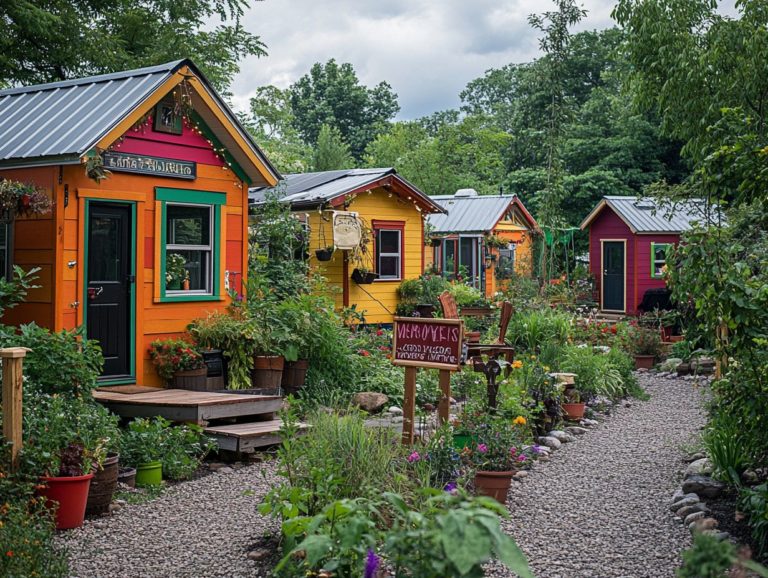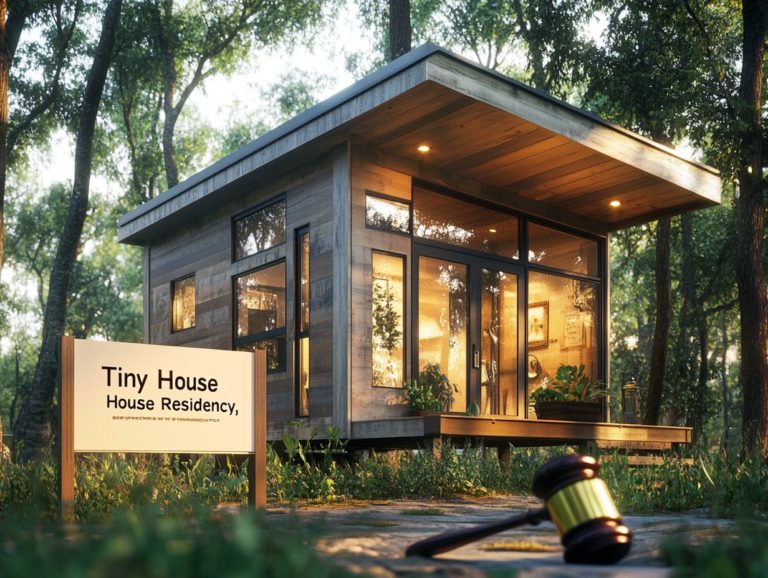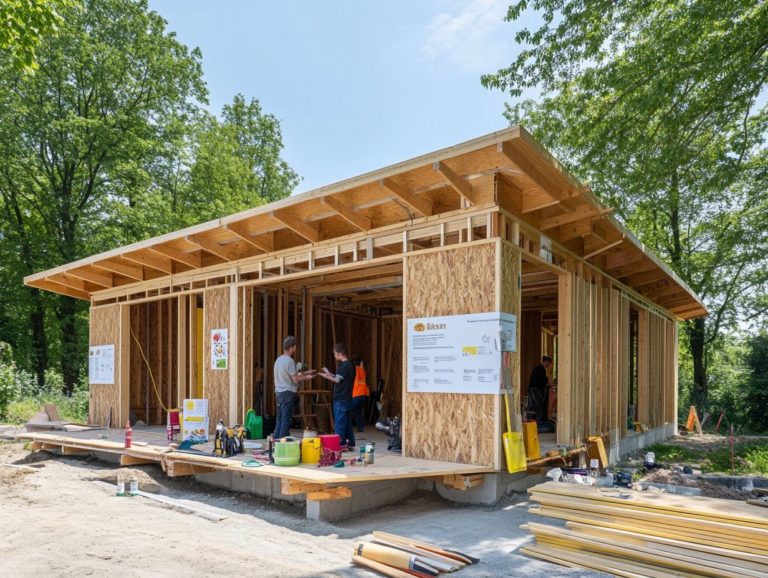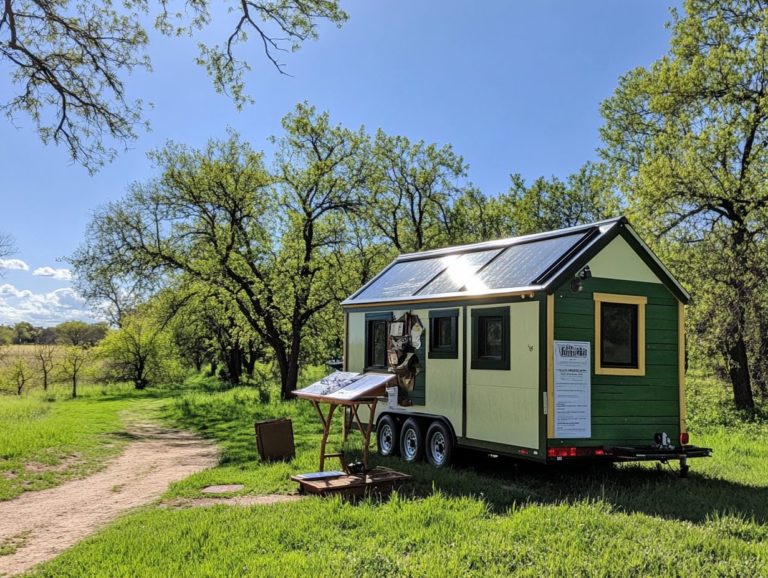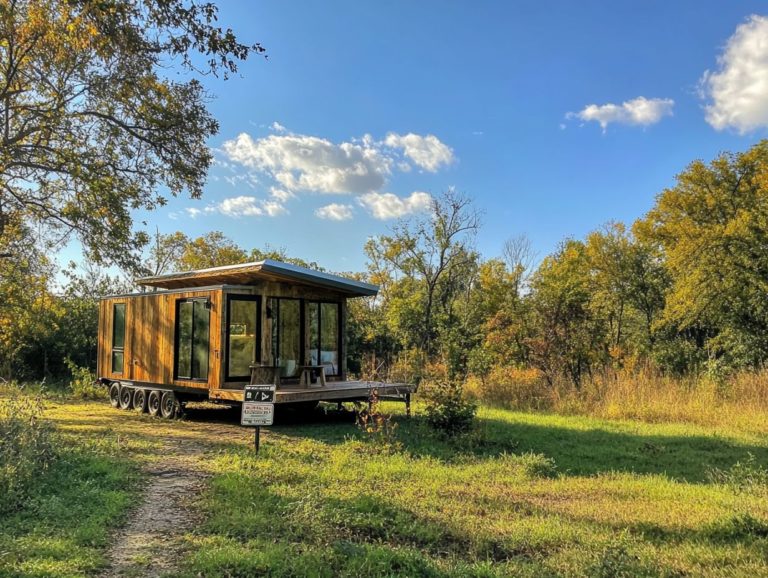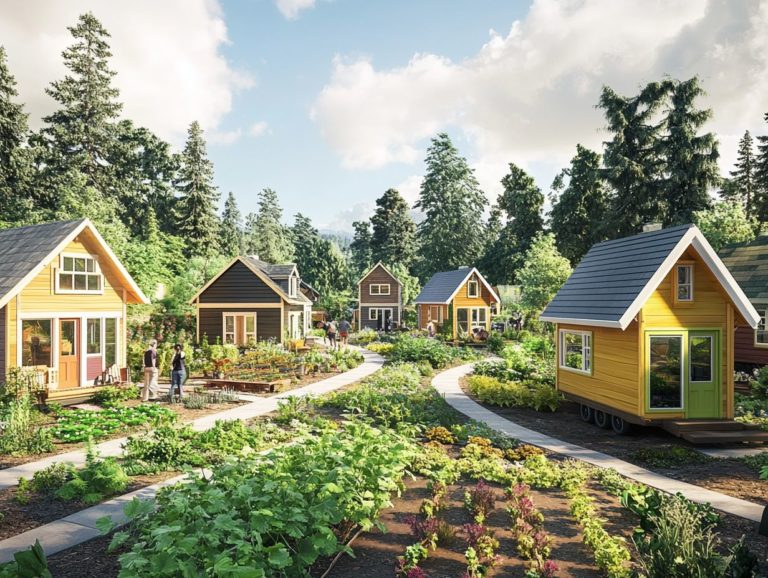Finding Legal Help for Tiny House Issues
Tiny houses are becoming increasingly popular as a solution for minimal living, but navigating the legal landscape can be quite complex.
As a tiny house owner, you may face zoning challenges and building codes that introduce a variety of legal issues requiring your careful attention. This guide will walk you through common legal hurdles, provide insights on how to find the right legal assistance, and outline the essential regulations surrounding tiny house living.
Whether you re already embracing the tiny house lifestyle or contemplating the move, grasping these legal aspects is vital for ensuring a seamless journey ahead.
Contents [hide]
- Key Takeaways:
- Understanding Tiny House Legal Issues
- Finding Legal Help for Tiny House Issues
- Navigating Zoning and Building Codes
- Legal Considerations for Living in a Tiny House
- Frequently Asked Questions
- What is the best way to find legal help for tiny house issues?
- What legal issues should I be aware of when living in a tiny house?
- Can I use online legal resources for tiny house issues?
- What are my options if I cannot afford a lawyer for my tiny house issue?
- What should I do if I am facing legal issues with my tiny house neighbors?
- What can I do to prevent legal issues with my tiny house in the future?
Key Takeaways:

- Consulting with a legal professional experienced in tiny house issues is crucial for navigating the complex legal landscape.
- Understanding zoning laws and complying with building codes are essential for legally living in a tiny house.
- Insurance, liability, and neighbor/community relations are important legal considerations for tiny house living.
Understanding Tiny House Legal Issues
Understanding the legal landscape surrounding tiny homes is essential for anyone interested in the tiny house movement. With the increasing popularity of tiny living, you must navigate local regulations, building codes, and safety guidelines to ensure compliance.
A thorough understanding of these issues gives you the power to build, occupy, and sell tiny homes without a hitch. Knowing about companies that certify tiny homes can significantly enhance your experience within a tiny house community.
Common Legal Issues for Tiny House Owners
As a tiny house owner, you’re likely to encounter a variety of legal challenges, many of which stem from local regulations and zoning laws.
These hurdles often present themselves in the form of strict building codes that may not align with the unique dimensions and efficiencies of tiny living. Navigating the maze of zoning regulations can be a significant obstacle, as many municipalities reserve specific areas for traditional homes, leaving scant opportunities for this innovative lifestyle.
Local governments are pivotal in either fostering or obstructing the tiny house movement through their policies, which can differ dramatically from one jurisdiction to another. For example, some regions have embraced tiny homes as a viable solution to affordable housing shortages, while others impose restrictive measures that hinder their growth.
Mastering these dynamics is key to unlocking your tiny house dream, as you need to consider everything from obtaining the necessary permits to following neighborhood rules.
Finding Legal Help for Tiny House Issues
Finding the right legal assistance for your tiny house concerns is essential to make sure you meet safety standards, adhere to local regulations, and fulfill legal certification requirements.
Types of Legal Professionals to Consult

When encountering tiny house challenges, various legal professionals can offer the critical guidance and support you need.
From real estate agents who grasp the complexities of zoning laws and land acquisition to attorneys specializing in tiny house safety regulations, the expertise of these professionals is truly invaluable. You may also find it beneficial to consult with representatives from certification companies that ensure compliance with safety standards and building codes, as well as navigating tiny house community regulations.
These experts can illuminate the legal landscape and help you navigate potential hurdles, making the process not only smoother but also more aligned with local regulations. This approach safeguards your investment and ensures that your tiny home meets both safety and legal requirements.
Explore your options today and make your tiny home dream a reality!
How to Find a Good Lawyer
Finding a skilled lawyer who understands the challenges of the tiny house movement can greatly improve your experience.
Local community members are often eager to share recommendations for lawyers specializing in tiny homes. They can help you find legal professionals who excel in this area.
Using online resources like legal directories and forums can also help. Ensure that any lawyer you consider has the necessary certifications and knowledge of tiny house regulations, as this influences how well your legal needs are met.
Navigating Zoning and Building Codes
Navigating local rules about land use and building codes is crucial for your tiny house journey. Local regulations can differ dramatically between areas such as California and El Paso County.
Understanding these nuances will empower you to make informed decisions! This ensures a smooth process in your pursuit of the perfect tiny living experience.
Understanding Zoning Laws
Understanding zoning laws is crucial if you re considering placing a tiny home on your property. These regulations can vary significantly from one jurisdiction to another, dictating where you can set up your tiny sanctuary and the specifics of its size and style.
For example, some areas might classify tiny homes as accessory dwelling units (ADUs). Others could impose restrictions requiring a conventional foundation. This could leave you grappling with the practical implications of these rules.
In regions with stringent single-family residential zoning, you might find that these structures are entirely prohibited. This complicates your aspirations for simple, minimalist living.
On the flip side, some areas that have flexible zoning encourage vibrant tiny house communities. These neighborhoods can spark innovation and create a sense of belonging among residents who share similar values centered around sustainability and minimalism.
Complying with Building Codes
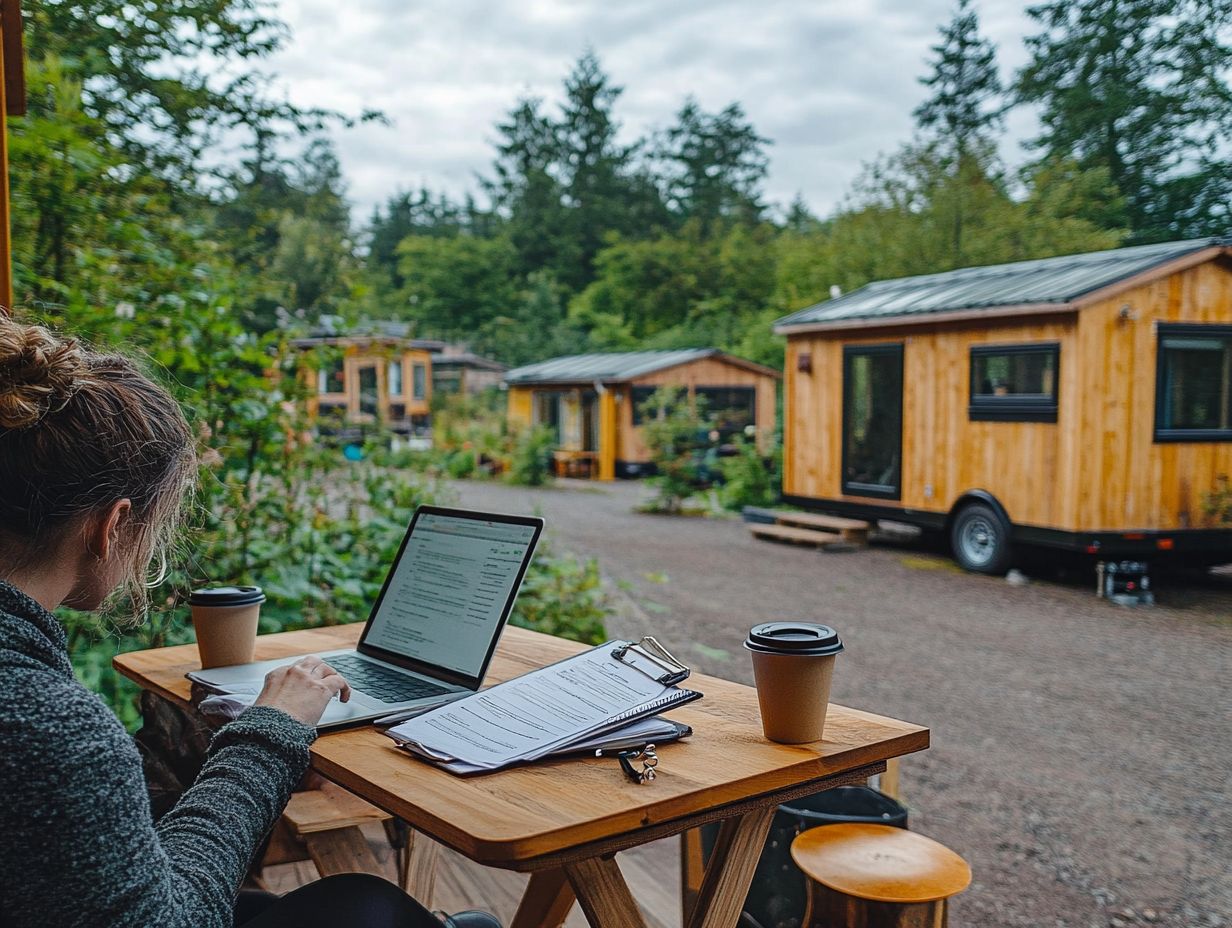
Complying with building codes is essential for ensuring that your tiny home meets safety and legal standards.
These codes provide a framework that governs everything from structural integrity to energy efficiency, ultimately safeguarding your living space. As a tiny homeowner, you’ll need to navigate tiny house legalities, which can vary dramatically depending on your locality.
Certification companies are vital partners in this journey. They help verify that your construction adheres to these critical standards. By obtaining the necessary certifications, you not only gain peace of mind but also elevate the resale value of your property.
Preparation for building inspections cannot be overlooked! This entails having all required documentation in order, understanding local requirements, and ensuring every aspect of your home is compliant. By following these practices, you foster a safe living environment and contribute positively to community standards.
Legal Considerations for Living in a Tiny House
When living in a tiny house, you need to understand various legal factors that affect ownership and community living. Consider zoning laws and building codes they’re essential for a smooth tiny home experience!
Insurance and Liability
Insurance and liability are essential elements of tiny house ownership, providing crucial protection against potential risks.
For you, as an owner of one of these compact residences, grasping the available policies is key to safeguarding your investment and living space. Understanding tiny house zoning laws is essential, as tiny homes often necessitate specialized insurance options that cater to unique challenges, such as their limited square footage and mobility.
Liability coverage is vital, as it protects you from responsibility for accidents that might occur on your property. Staying compliant with local safety guidelines like fire regulations and structural standards can significantly impact your insurance requirements.
Explore different policies to confidently navigate insurance and ensure peace of mind for your unconventional lifestyle!
Dealing with Neighbors and Community
Making connections with neighbors and the surrounding community can present unique legal challenges for tiny house owners.
As you navigate tiny house neighborhoods, you may face a variety of issues, from differing opinions on property boundaries to conflicts over shared resources. These interactions can spark disputes that need careful handling to maintain a harmonious living environment.
Local governments play an important role in mediating these matters, often establishing guidelines and rules that determine how land can be used designed to promote positive relationships among neighbors.
By fostering open communication and offering resources for conflict resolution, municipalities can help cultivate a sense of community while addressing the specific needs of those living in smaller, unconventional homes.
Frequently Asked Questions
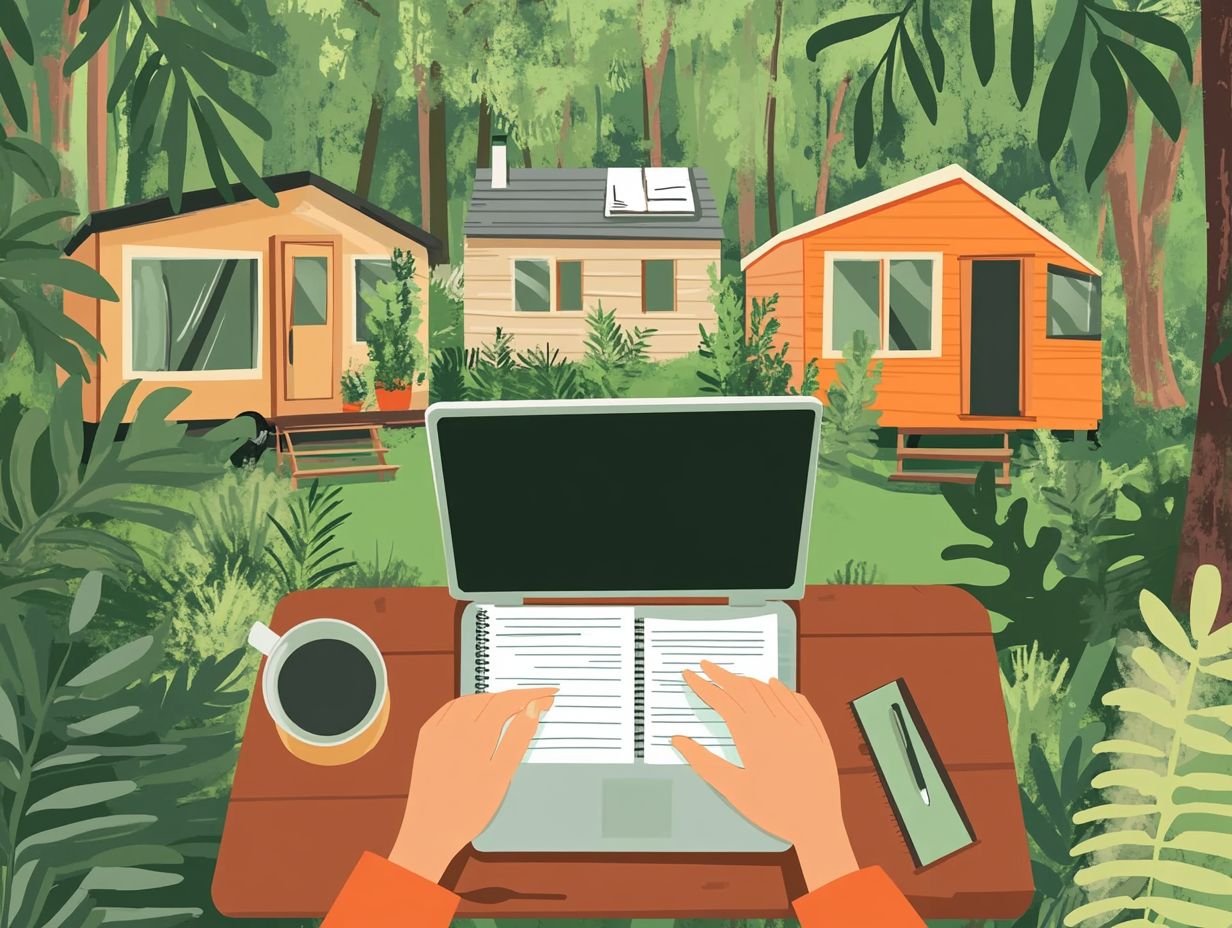
What is the best way to find legal help for tiny house issues?
The best way to find legal help is to research and find a lawyer or legal organization that specializes in housing and property laws. You can also seek recommendations from friends, family, or online forums for individuals who have dealt with similar issues.
What legal issues should I be aware of when living in a tiny house?
Some common legal issues include zoning and building code regulations, parking and land use laws, and property tax laws. It is important to research and understand these laws before building or living in a tiny house.
Can I use online legal resources for tiny house issues?
While online legal resources can provide general information on tiny house laws, it is always best to consult with a lawyer or legal organization for specific and accurate advice. Laws and regulations vary by location and change frequently, so professional guidance is crucial.
What are my options if I cannot afford a lawyer for my tiny house issue?
If you are unable to afford a lawyer, you may qualify for free legal aid services. These services are often provided by non-profit organizations and can assist with issues related to housing and property. You can also reach out to law schools, which may offer free or low-cost legal assistance through their clinics.
What should I do if I am facing legal issues with my tiny house neighbors?
If you are facing legal issues with your neighbors, it is best to communicate and resolve the issue peacefully. If this is not possible, seeking legal help may be necessary to protect your rights. Document any conflicts with your neighbors for evidence in case legal action is needed.
What can I do to prevent legal issues with my tiny house in the future?
To prevent legal issues in the future, research and understand all laws and regulations related to tiny houses in your area. It is recommended to have all necessary permits and approvals before building or living in a tiny house. Regularly checking for updates and changes in laws can also help prevent potential legal issues.
For further assistance, consider reaching out to local legal resources or organizations that specialize in tiny house issues!

